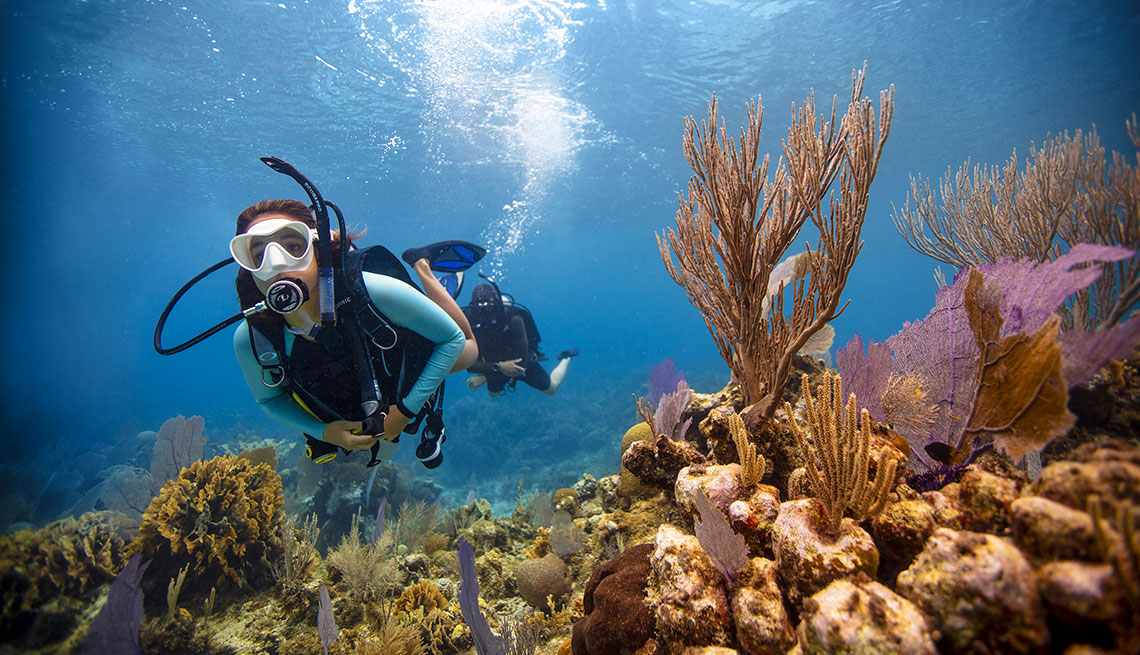
Want to learn to scuba dive on vacation?
- Select a language for the TTS:
- UK English Female
- UK English Male
- US English Female
- US English Male
- Australian Female
- Australian Male
- Language selected: (auto detect) - EN
Play all audios:
If the world is a book and those who don’t travel read only a page, then those who don’t scuba dive are getting only one angle on some of the world’s most wondrous views. When you pull a
scuba mask over your eyes, pop a regulator into your mouth to breathe and descend to eye level with marine life and corals, the ocean simply looks different. “It’s easier to become a diver
than you think — and far more rewarding,” says Julie Andersen, senior director of global brand for the Professional Association of Diving Instructors (PADI), the largest scuba training
organization in the world. “Not only will you be able to access amazing adventures in the blue, but you’ll also connect with a new community of ocean lovers.” About 10 percent of PADI’s
certifications in 2022 were for adults 50 and older, the group reports. And since the pandemic, there has been a 49 percent increase in certifications for those 50-plus. All dive courses —
whether through PADI or another certifying agency, such as the National Association of Underwater Instructors (NAUI) or Scuba Schools International (SSI) — involve coursework, most of which
can be done by eLearning. Andersen recommends doing your coursework at home and then choosing a dream destination to complete your certification with pool dives (if you didn’t do those
through a local shop) and open-water dives. SSI similarly offers a digital learning application, available in more than 30 languages, that allows coursework to be done both online and
offline, says Rachael Steidley, marketing coordinator for SSI. Anyone taking an open-water course with PADI or SSI is required to complete a medical form that asks about basic health and
preexisting conditions, to ensure you’re a good candidate to dive. After age 45, PADI requires a signed doctor’s note that says you’re healthy enough for scuba diving. There’s no age cutoff
when it comes to diving, says Jim Chimiak, M.D., chief medical officer for the Divers Alert Network (DAN), a diver safety organization. Chimiak, 66, recommends considering your strength and
fitness prior to becoming a diver. They’re two separate things, he explains. Strength is being able to handle the rigors of diving, and fitness is being able to perform the things you’re
going to be asked to do in and out of the water, he says. Among those things are carrying your gear, potentially swimming in a current, and using a ladder to get back into the boat after a
dive, if you plan to be a fully qualified diver. While lacking the strength and fitness to do the above and more doesn’t mean you can’t dive, Chimiak says, it does mean you’ll need a
dedicated team to assist you with gear and other logistics in and out of the water. Engaging in regular physical activity and maintaining flexibility are good ways to enhance your diving
experience, says Cliff Richardson, executive director and CEO of NAUI Worldwide. “Many older divers find yoga and swimming to be excellent preparatory activities,” he says. Divers of all
ages need to seriously consider any health conditions. Potential contraindications for diving include seizure disorders, severe cardiac disease, history of stroke, severe musculoskeletal or
neurological conditions, asthma, COPD, and middle or inner ear conditions.